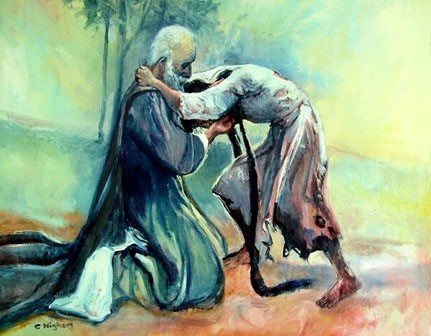Fourth Sunday in Lent -Luke 15:1-3, 11b-32 - Karen Hollis


Sermon, Announcements, Prayers of the People and the Order of Service for the Fourth Sunday in Lent Luke 15:1-3, 11b-32
Karen Hollis
May the words of my mouth and the meditations of all our hearts be reflections of your word to us in Christ Jesus. Amen.
Um
Quaker theologian Parker Palmer in his early 40’s decided to do the outdoor challenge program, Outward Bound. He found himself in a climbing harness, at the top of a 110 ft cliff; his task was to repel while walking his feet down the wall. It started out touch and go, but about halfway down there was a hole in the rock face and he froze; his instructor called up, “Is anything wrong, Parker?” There on the cliff, he found himself unable to go back and unable to go forward, forcing a reckoning with himself. He called back to the instructor in what he describes as a childlike voice, “I don’t want to talk about it.” The instructor called back, “then I think it’s time you learned the Outward Bound motto . . . if you can’t get out of it, get into it.”[1]
The younger brother in this morning’s parable is also faced with a reckoning . . . I’m quite struck by his audaciousness as the story sets out. To describe him as bold is generous . . . he is determined, full of himself . . . and beloved child of God. He is embraced at the end of his escapade by natural consequences. I love a good natural consequence. His choices lead him to sitting in the mud with the pigs, longing for their food . . . and in that place having lost the fullness of his ego, he thinks critically about his life, perhaps for the first time. When you can’t get out of it, get into it . . . he never realized what a gift it is to have a father like his; even his servants live a good life . . . there is his way forward.
The older brother is in a way a bit more challenging because he is disconnected from his father for far more subtle reasons. He has an integral role within the system of his father’s property, he’s invested in it, and he feels entitled to it because of his loyalty. So, how does he find generosity in his heart for a sibling who disgraces the family, disappears and dares to return, making him entitled again to his portion of their father’s wealth? His entitlement keeps him from understanding what his brother has managed to learn: their father’s wealth is not his land . . . it is the way he leads with empathy and compassion, generosity and love. That is the real inheritance. Land and riches are finite, but root them in love and you can transform the world. For the older brother to inherit his father’s legacy, somehow he needs to learn that lesson. It’s unclear at the end of the parable whether the brother will be able to look through his selfishness, pride, ego and search his own heart.
Both sons are offered a blessing; one son comes with full humility, astonished by his father’s generosity, grateful just to be fed. The older brother stands stewing in the wings, angry at everyone and anxious to act on his feelings to give his brother more consequences. I understand his feelings . . . and . . . addressing them is not the invitation. His father begs him to simply come in and receive his blessing “Everything I have is yours,” he says, “but we had to celebrate and rejoice, because this brother of yours was dead and has come to life; he was lost and has been found.” The story ends without resolution . . . which really highlights our human condition. The road to our own truth is a rough one, even when at the end of the road we encounter our endlessly forgiving and loving God. Walter Brueggemann captures it well at the end of his poem, Reach us . . . We yearn to hear your call,
afraid to hear,
because it means returning through the mists of harshness,
through the risk of mercy,
in a journey we fear and crave,
want and dread,
pledge and renege,
start and hesitate,
all in our double-mindedness.[2]
We’re grateful, O God that you keep calling us home, even when we think we’re already there. Give us the humility to truly seek you and receive the blessing you eagerly offer. Amen[3]
[1] The Active Life, Parker Palmer, 32-33.
[2] Awed to Heaven, Rooted in Earth, Walter Brueggemann, 59.
[3] Sermon written with the help of The Prodigal God, by Timothy Keller
Contact Info
Christ Church Gabriola
- 2600 South Road
- Gabriola Island, BC
- V0R 1X7 Canada